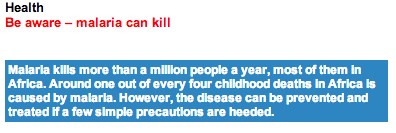
Enoch Khensani*, a 42-year-old member of the Government Employees Medical Fund, recently fell ill. Enoch, who works at the Department of Public Works in Johannesburg, returned from a visit to his hometown in Maputaland in northern KwaZulu-Natal, after a long break of two years.
Two weeks after returning to Johannesburg Enoch fell ill with what he was sure was flu. His symptoms included fever, chills, headache, body aches, joint pains, coughing and diarrhoea.
But Enoch had caught something potentially far more serious than flu. His doctor suspected this and had him tested for malaria. To Enoch’s surprise, he tested positive for malaria. Even though he had lived in northern KwaZulu-Natal, a malaria area, through his childhood he had never had malaria. His doctor explained that people who lived in malaria areas often develop a semi-immunity to it. However, they lose this immunity after living in non-malaria areas such as Gauteng for a year or more.
Visit your doctor
Enoch made a complete recovery after treatment. He was wise to insist on getting medical help because malaria can cause serious complications if left untreated.
If you do develop any signs of the disease after visiting a malaria area visit your doctor immediately. It could save your life.
As in Enoch’s case, the early symptoms are often flu-like and it is commonly confused with flu by both patients and doctors. Malaria can develop as early as seven days after entering a malaria area and for up to six months after leaving.
Malaria areas
Malaria is spread through the bite of a mosquito called the Anopheles mosquito.
It is quite common in southern Africa where it is found in northern KwaZulu-Natal and Limpopo, as well as in the eastern areas of Mpumalanga and in Swaziland, Mozambique, Zimbabwe, Botswana, Namibia, Angola and Zambia. It also occurs in most other African countries including Uganda, Kenya, Ivory Coast, Ethiopia and Ghana.
Nobody is immune to malaria, so whether you travel for business or leisure to these areas you are always at risk.
Protect yourself
There are a number of ways to protect yourself, including through the use of preventative medication.
While this will usually prevent you from getting malaria or help to reduce the severity of the symptoms, no medication offers complete protection. It is vitally important to continue taking your medication as your doctor instructs you. Some medications require that you continue to take them for a couple of weeks after your visit to a malaria area. This should be done even if you think mosquitoes did not bite you during your stay.
One of the best ways to prevent malaria, is to make sure that mosquitoes do not bite you.
Preventative measures:
- wearing long-sleeved clothing and long trousers from dusk until dawn when you are outside
- putting on mosquito repellent lotions or sprays
- using mosquito coils, electric air repellents and insecticidal sprays to kill or chase off the insects
- sleeping under mosquito nets
- staying in places that have mosquito screening on doors and windows.
-Source: Government Employees Medical Scheme (GEMS)



 Facebook
Facebook Twitter
Twitter WhatsApp
WhatsApp